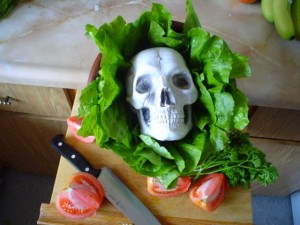With two dead and at least 151 sick with E. coli O157, believed to be from imported rocket (like bagged lettuce), Public Health England (PHE) says the products are still on supermarket shelves because the source of the outbreak had not been confirmed.
 Instead, officials are reiterating advice to wash vegetables, including salad leaves, thoroughly before eating them.
Instead, officials are reiterating advice to wash vegetables, including salad leaves, thoroughly before eating them.
Washing is not going to remove much E. coli O157.
Stephen Adams of the Daily Mail writes that children are among those ill.
PHE would not say if the more than 60 patients needing hospital treatment were children or among the fatalities.
Several food wholesalers have been told to ‘stop adding some imported rocket leaves to their mixed salad products while investigations are ongoing,’ said the Food Standards Agency.

 and hundreds of thousands of E. coli bacteria were found in samples of one gram, about the size of a small leaf.
and hundreds of thousands of E. coli bacteria were found in samples of one gram, about the size of a small leaf.